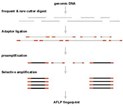Tour de force— near complete expression analysis of Arabidopsis genes

AFLP is a DNA fingerprinting technique that detects restriction fragments by means of a set of semi-selective PCR amplification reactions.

Schematic diagram of AFLP.
While originally conceived for the fingerprinting of genomic DNA, Keygene has adapted AFLP for use with cDNA preparations to display and quantify expression profiles. A key feature of AFLP with respect to this application is the uniform efficiency of each PCR reaction. In a given AFLP reaction, all the fragments are primed from an identical primer, which obviates some of the pitfall of multiplexing with different primer sets. This feature enables precise quantitation that reflects actual abundance. Other advantages of AFLP are that sequence information is not necessary, the technique detects very low abundance transcripts, and a large fraction of the genes can be detected.

Example of a AFLP fingerprint.
Using this technology, the two companies have amassed a database for 20 tissues and organ systems, representing approximately 20,000 Arabidopsis genes. This data, according to Ceres' chief operating officer, Mark Vaeck, will "provide us with a comprehensive view of the behavior of plant genes and will accelerate our discovery of important gene functions and pathways. We are applying this knowledge to screen for novel agrochemicals, improve crops through molecular breeding, and develop high-value genetically enhanced plants."
"While the knowledge has been created for Arabidopsis thaliana, a model species, it is directly useful for understanding and predicting the role of genes in commercial crop species such as corn, wheat, soybean and canola," stated Richard Flavell, chief scientific officer of Ceres. He added, "Integrating the expression data with our proprietary databases of full-length cDNA sequences and plant phenotypes helps us to quickly build a broad intellectual property position on plant genes and their functions."
Established in 1989, Keygene has, in the last few years, developed and fine-tuned the AFLP technology for analyzing genome structure and gene expression in plants. Pieter Vos, chief scientific officer of Keygene and co-inventor of AFLP, adds: "The collaboration between Keygene and Ceres has enabled us to develop this database in a very competitive timeframe by combining genomics technologies, plant biology knowledge, and bioinformatics tools from the two companies."
Keygene and Ceres will now take on the task of creating expression profiles of several commercially important crops. "We have been very pleased with the speed of delivery and quality of the AFLP data generated by Keygene," said Vaeck. "Ceres will continue to engage in strategic alliances with leading technology companies, such as Keygene, to increase the speed and quality of data collection for its proprietary plant genomics knowledge base."
Ceres is a privately held plant genomics company, which apples multiple genomics technologies in an integrated assembly line to establish broad knowledge and intellectual property with respect to plant genes and their function. The company's technology platform includes full-length gene sequencing, microarray-based expression analysis, knock-out mutant screening, ectopic overexpression, and bioinformatics. Ceres intends to be the leading independent provider of proprietary genes and traits, and related products and services, to the seed, agrochemical, chemical, food, feed, fiber, and healthcare industries.
Keygene N.V. focuses on the structure and function of genetic information, having developed a proprietary technology platform based on AFLP and cDNA-AFLP, a high-throughput expression profiling technology. Keygene applies and exploits AFLP and other proprietary technologies and genomic databases through contract research, services and products for wide applications in the life sciences industry.
For more information: Ceres Inc., 3007 Malibu Canyon Rd., Malibu, CA 90265. Tel: 310-317-8900. Fax: 310-317-9978.
Keygene N.V. , P.O. Box 216, 6700 AE Wageningen, The Netherlands. Tel: +31 317-466-866. Fax: +31 317-424-939. Email: info@keygene.
